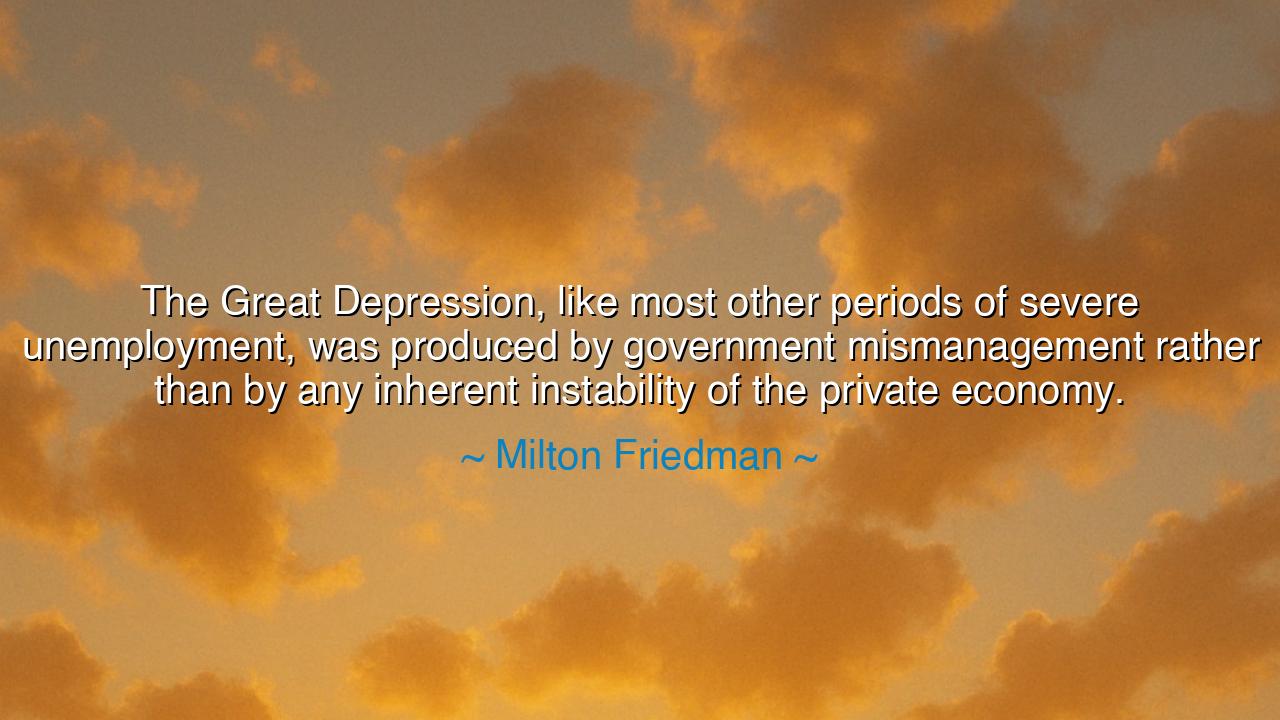
The Great Depression, like most other periods of severe
The Great Depression, like most other periods of severe unemployment, was produced by government mismanagement rather than by any inherent instability of the private economy.






"The Great Depression, like most other periods of severe unemployment, was produced by government mismanagement rather than by any inherent instability of the private economy." – Milton Friedman
In these resolute and thought-provoking words, Milton Friedman, one of the great economists of the twentieth century, pierces the fog that often surrounds the history of economic suffering. His statement is both a challenge and a revelation. When he declares that “The Great Depression… was produced by government mismanagement,” he does not merely accuse—he illuminates. He reminds us that even in times of despair, the failure of freedom is not the failure of freedom itself, but of those who mishandled it. The power of his insight lies in its reversal of a common belief: that chaos comes from the market, and order from the state. Friedman, instead, teaches that it is often the state’s interference, the misjudgment of those in power, that turns hardship into catastrophe.
The origin of this quote lies in Friedman’s lifelong battle against the idea that capitalism is inherently unstable or cruel. Along with Anna Schwartz, he wrote A Monetary History of the United States, a monumental work that reexamined the causes of the Great Depression. In their research, they discovered that it was not greed, speculation, or market failure that plunged the world into despair—it was the Federal Reserve’s contraction of the money supply, the tightening of credit when the economy most needed relief. Banks failed not because of natural decay, but because the government allowed them to fail. Businesses crumbled because the financial lifeblood was withheld. Friedman’s conclusion was revolutionary: that the private economy, left to heal, would have recovered; it was policy, not nature, that deepened the wound.
To understand the power of his words, one must remember the human face of the Great Depression. In the early 1930s, factories were silent, families were starving, and the lines of the unemployed stretched like rivers of despair through every city. Yet beneath that suffering, Friedman saw not the death of capitalism, but its suffocation by misguided guardians. The Federal Reserve, fearing inflation, withdrew money from circulation. In doing so, it choked enterprise and hope alike. Like a physician draining blood from a fainting patient, the government acted in fear and ignorance, worsening what it sought to cure. Friedman’s insight, then, is both economic and moral: good intentions without wisdom can become instruments of destruction.
History offers another echo of his warning. In post-war Germany, after the Second World War, the economy lay in ruins—its currency worthless, its people desperate. Yet when the government removed price controls and allowed markets to function freely under Ludwig Erhard’s leadership, a miracle occurred. Within months, goods reappeared, trade revived, and hope returned. The same spirit that Friedman praised—the resilience of the private economy when allowed to breathe—lifted a nation from rubble to prosperity. Freedom, when respected, restored dignity faster than any decree or plan.
Friedman’s message carries a timeless truth: the private economy is not a reckless beast—it is a living organism, driven by creativity, risk, and reward. When government grows overconfident, thinking it can command markets as a general commands armies, it forgets that economies are not machines but millions of hearts and minds acting in harmony. To overmanage is to misunderstand human nature. The true strength of a society lies not in central control, but in the liberty of individuals to build, trade, and trust.
Yet, Friedman was no anarchist. His wisdom was born of balance. He did not call for the end of government, but for its humility—for rulers to remember that they are servants of prosperity, not its architects. His warning rings clear across time: when the state overreaches, even with noble intentions, it risks destroying the very prosperity it seeks to protect. The path to progress is paved not with constant intervention, but with steady faith in the power of human ingenuity.
The lesson of Friedman’s words, therefore, is both intellectual and spiritual. Trust in freedom. Guard it, nurture it, but do not smother it with fear. When difficulties arise, resist the temptation to hand all power to the few who promise safety through control. True stability is not born of command but of confidence—confidence in the wisdom of individuals, in the vitality of the market, in the self-correcting nature of free exchange.
Let this teaching be passed to future generations: that freedom, though imperfect, is the surest foundation of human flourishing. The Great Depression was not the death of capitalism, but a warning about the arrogance of power. When government forgets its limits, it becomes the architect of the very misery it fears. Let us, therefore, remember Friedman’s truth: that prosperity is not granted from above, but grown from below—from the courage, work, and wisdom of free men and women, whose liberty is the lifeblood of every enduring nation.






AAdministratorAdministrator
Welcome, honored guests. Please leave a comment, we will respond soon